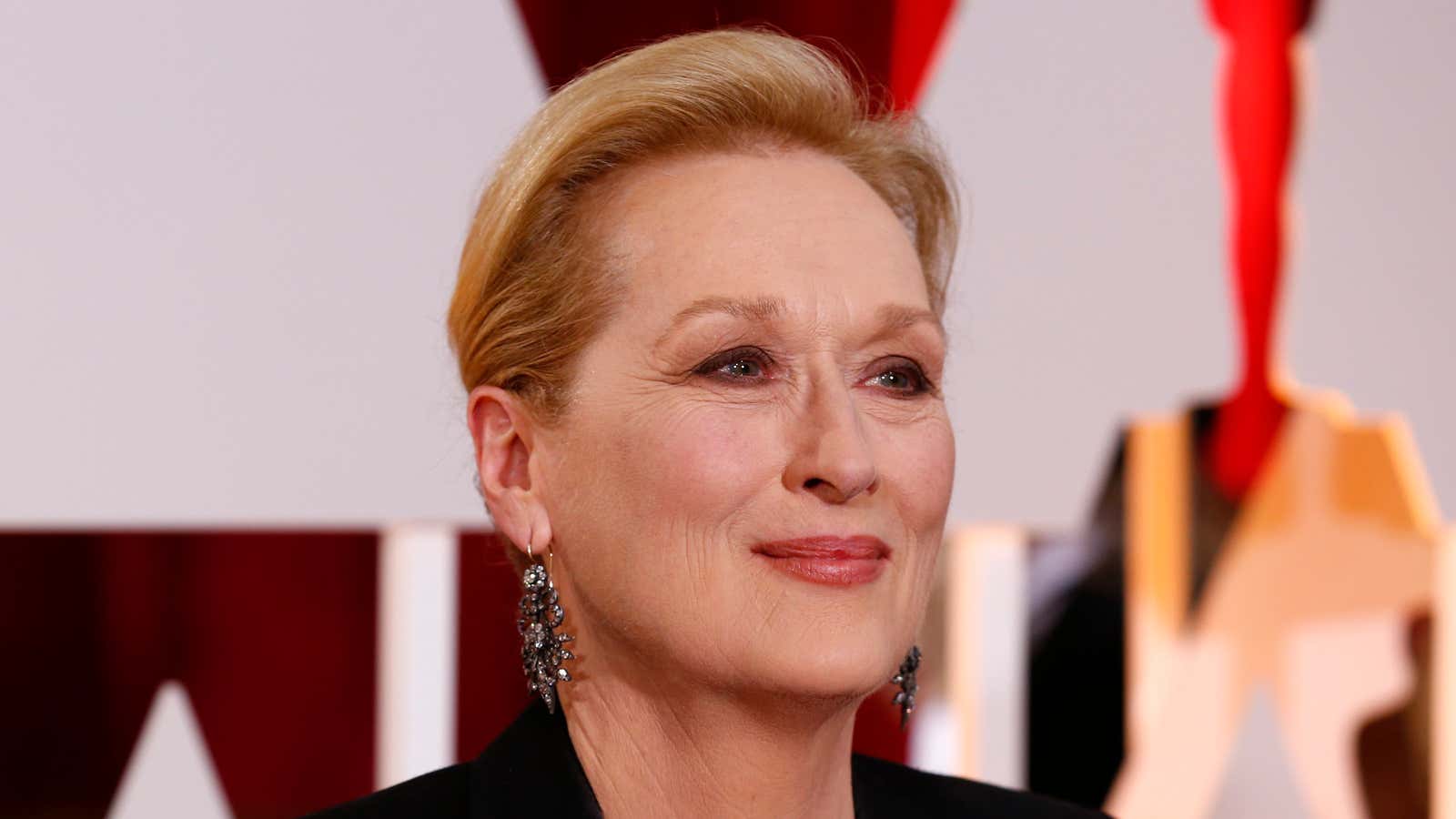American comedian Amy Schumer blew up social media this week with a parody sketch brilliantly skewering ageism in Hollywood. The skit, “Last F**kable Day,” features Schumer stumbling upon a trio of actresses, Julia Louis-Dreyfus, Tina Fey, and Patricia Arquette, enjoying a beautiful celebratory picnic. The occasion? Louis-Dreyfus’ last f**kable day—according to the media—after which she will only be considered for roles as mothers, grandmothers and other characters generally deemed “undesirable.” As Louis-Dreyfus explains it, you know your career has officially peaked in the eyes of men (and some women) when “you go to wardrobe and the only thing they have for you to wear are long sweaters that cover you up head to toe.”
The skit is so bitingly funny in part because female viewers understand a much uglier truth is lurking just beneath its surface: sexism in Hollywood is still rampant, and the women involved are totally over it.
Now, increasingly, they’re also doing something about it.
One of the big ways women and minorities can ensure more accurate, equitable representation is by diversifying the people who devise the plots. Women’s involvement in Hollywood hovers around 30% industry-wide; when it comes to screenwriting that number drops significantly to about 15%. This eye-popping disparity may be why a new writer’s lab for female screenwriters over 40 has already received so much attention.
Funded largely by Hollywood superstar Meryl Streep, The Writer’s Lab is a partnership between New York Women In Film and Television (NYWIFT) and IRIS (a collective of female filmmakers) that will select eight female screenwriters for a three-day workshop of intensive script development and screenplay polishing. Each participant will be paired with already-successful female, writers and producers; the hope being to give a leg up to a demographic too often overlooked.
As NYWIFT director Terry Lawler noted in a statement: “After decades of ageism and sexism in our culture and in our films, the complex voices of mature women are in danger of being lost entirely. Women must address this inequality by taking ownership of that narrative.”
The numbers truly speak for themselves. According to researcher Susana Orozoco, women in Hollywood sell only about 10% of spec scripts. Equally problematic, of the 250 top-grossing movies of 2014, only 11% were written by women. When women are compensated for their screenwriting work, that compensation tends to include a wage gap—women in the business earn 90 cents for every dollar earned by a white male.
But the dearth of women in the business (particularly women over 40) is about way more than just job figures; it’s about what voices are heard and which stories are considered worthy of mainstream cinematic attention. As Melissa Silverstein, founder and editor of Women and Hollywood told Quartz, we as a culture “devalue women’s experiences as they get older, and male experiences become more valid in our world.”
With more female-written stories come more strong female characters and dynamic female roles. And it’s about time: a woman hasn’t won the Academy Award for best original screenplay since Diablo Cody took it home for Juno—and that was all the way back in 2007. Factor in the glaring reality that women make up half of the population and at least 50% of movie ticket sales, and the absurdity of the discrepancy is distressingly clear.
“The myth is that men can write everything for everybody and women can only write relationship stories for women,” Lawler told Quartz. “Even if this were true, what is wrong with writing for women? We buy movie tickets! We have influence!”
Neither money nor history is on the women’s side, as men continue to dominate production company box offices and talent agencies. Equally unhelpful is Hollywood’s current moneymaking trend which, at least right now, prioritizes big, male-centric superhero movies. (Although perhaps that will change with the pending Wonder Woman).
The good news is that the Writer’s Lab is part of a growing effort to finally level the playing field. Screenwriter Kiwi Smith (who wrote Legally Blonde and is serving as a mentor in The Writer’s Lab) went so far as to call the movement a “sea change” in an interview with Quartz. “The floodgates are opening.
Hopefully, the Lab will give more women the tools to produce the next Obvious Child or Bridesmaids (both written by women.) “These stories don’t happen because women asked for permission,” another mentor, screenwriter and filmmaker Jessica Bendinger (who wrote Bring It On), noted. “They just did it. If we can play a small part in encouragement that leads to more diverse, high-quality work? Yes, yes, yes!”




